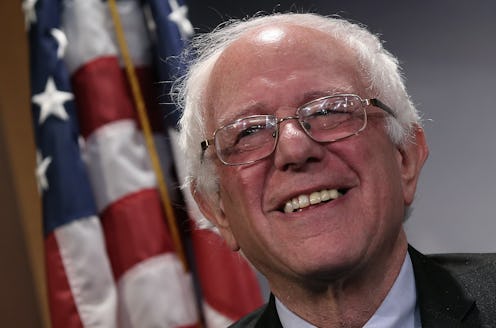News
How WIll Being Jewish Affect Bernie Sanders?
When John F. Kennedy ran for president in 1960, one of the biggest concerns voters had about the two-term senator from Massachusetts with a heroic war record wasn't that he was too young (he became the country's youngest president), or too liberal, but that he was Catholic. Kennedy was the nation's first Roman Catholic president, and back then, many questioned whether he could keep his religious views separate from the decisions he would have to make as Commander-in-Chief. That same question can now be posed to Bernie Sanders, whose religion could also make him a first for America.
Sanders is Jewish, and the United States has never had a Jewish president. But with Sanders' rising popularity, there's now a possibility that we could. Sanders has started making gains on Democratic front-runner Hillary Clinton, with larger-than-expected crowds turning out at his campaign rallies. Sanders was raised Jewish, son of a Polish-Jewish immigrant father and an American mother, and lived on a kibbutz in Israel after his graduation from the University of Chicago, according to the Burlington Free Press.
But Sanders says he is not actively religious nor part of any organized religion. In fact, he finds himself "very close to the teachings of Pope Francis," the Free Press reported.
So how likely is it that American voters are ready for a Jewish president? A Gallup poll from earlier this month showed voters overwhelmingly support the idea: 91 percent said they'd vote for a Jewish candidate. That's greater than the 81 percent who said they would vote for a Mormon (sorry, Mitt Romney), and ahead of the 73 percent of those polled who said they'd vote for an evangelical Christian.
Gallup started asking the religion question in 1937, and as one might imagine, the responses have changed dramatically over time. In 1937, only 46 percent polled said they would vote for a Jewish candidate, compared to 82 percent in 1967 and 92 percent in 2007.
But unfortunately for Sanders, he also belongs to a category that scores particularly low among Americans: Only 47 percent of those polled said they'd vote for a socialist candidate. Sanders has repeatedly described himself as the only socialist in Congress and is one of only two Independents in Congress (Angus King of Maine is the other). He's running on the Democratic ticket, Sanders said, because to run as a third-party candidate is prohibitively expensive, and he didn't want to play "spoiler" as many say Ralph Nader did in the 2000 election.
Do the large crowds and positive response to Sanders' campaign indicate a willingness to accept a socialist candidate? Perhaps. It will be interesting to see if his popularity continues as the campaign evolves and he has to go head-to-head with the more mainstream Clinton.
Images: Getty Images (2)
